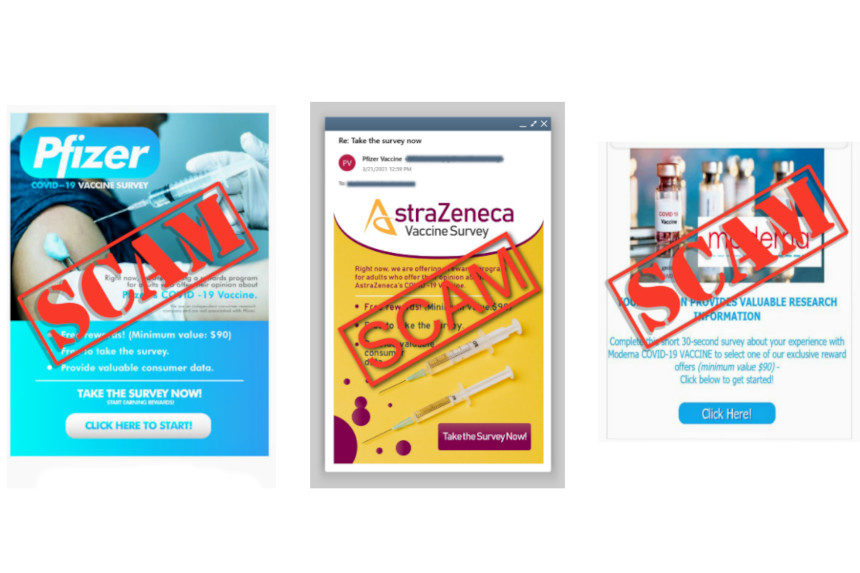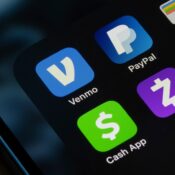Steve Weisman is a lawyer, college professor, author, and one of the country’s leading experts in cybersecurity, identity theft, and scams. See Steve’s other Con Watch articles.
The Coronavirus pandemic has resulted in more than 564,000 deaths in the United States, but has also brought a pandemic of scams, which continue unabated. In the early days of the pandemic, many of the scams involved phony websites purporting to provide critical information about the Coronavirus. Later scams promised priority access to the new vaccines. Now with more than 195 million doses having been administered, some scammers are turning their attention to the recently vaccinated.
Phony Pfizer, Moderna, and AstraZeneca surveys are offering prizes worth $90 or more merely for answering a few questions about your experience with the vaccine. Originally these phony surveys were turning up primarily on Facebook. Now people are getting emails and text messages that appear to come from the vaccine manufacturers. Victims are asked to pay for shipping fees for their prize by supplying their credit card or debit card number. In some instances, merely clicking on a link to answer the survey — even if you do not provide any of the requested information — can download dangerous malware that can lead to your becoming a victim of identity theft or being cheated out of money.
These phony surveys often come from email addresses that clearly indicate that they have nothing to do with Pfizer, Moderna, or AstraZeneca. In one version, the logo doesn’t even match.
The first thing to remember is that no legitimate survey asks for credit card or debit card information in order to pay for a “free” reward. Never provide personal information in response to an email, phone call, or text message unless you have absolutely confirmed that the communication was legitimate and there is a need to provide the information.
One of the reasons I have advised people not to post their vaccination cards on social media is because when you do, you alert scammers that you have been vaccinated, which prompts them to send you such surveys. The timing may make the phony survey seem legitimate.
Finally, if you wish to confirm whether or not these companies are doing legitimate surveys, go to their respective websites, where you will find that these surveys are all scams.
Another Coronavirus scam that is just now gathering momentum involves a government program to provide reimbursement for up to $9,000 in COVID-19 related funeral costs incurred after January 20, 2020. The Federal Emergency Management Agency (FEMA) began taking applications for the program on April 12, which is available to all American citizens and non-citizens who are legally in the United States; there are no income or asset qualifications.
Unfortunately, scammers have seized on this program and are posing as FEMA officials offering to help people apply for the funeral payments. In some of these scams, they may ask for a fee as a part of the application process or request your Social Security number, bank account number, or credit card number in order to process the application. Any money you pay them is lost forever, and any information you provide will be used to make you a victim of identity theft.
It is important to know that FEMA is not contacting anyone by email, text message, or phone call to inform them about the program or offer to assist in the application. In addition, there are no fees required to apply for these benefits. Finally, you are not required to provide your Social Security number, bank account number, or credit card number to apply for these benefits.
Even if your Caller ID indicates that the call is from FEMA, it is a simple matter for scammers to “spoof” the telephone number of FEMA and manipulate your Caller ID so it appears that the call is coming from FEMA.
The only way people can apply for the real FEMA funeral benefits program is by phone at 844-684-6333. No online applications are accepted.
Featured image: Examples of phony surveys (Federal Trade Commission)
Become a Saturday Evening Post member and enjoy unlimited access. Subscribe now




Comments
I enjoy your articles so much more since I switched to Microsoft Edge from Google Chrome to view them. Using Edge I don’t get any of the Google ads filling up the sides of the pages.
Fake Scam warnings are timely and needed today. Very informative. Thank you
This is good information since there are unfortunately enough gullible (or not too smart) people out there that will fall for these new fake scams containing most of the same elements as all of the old ones.